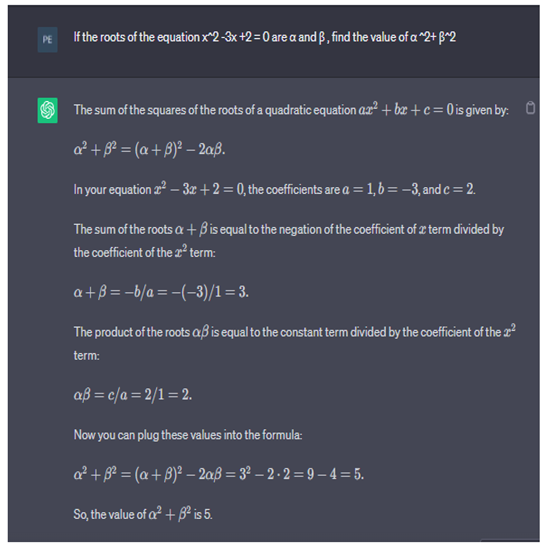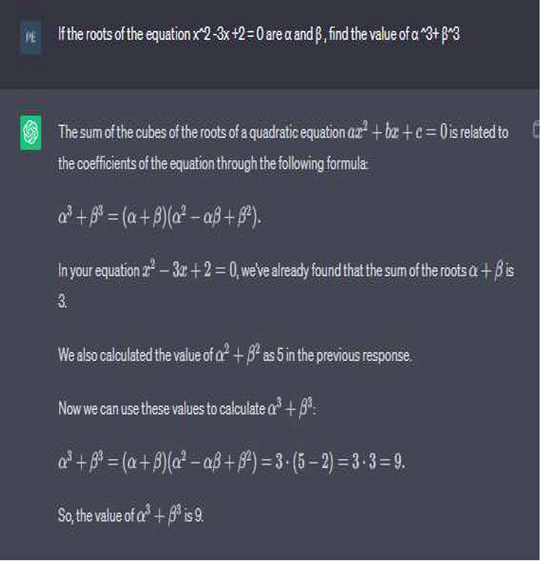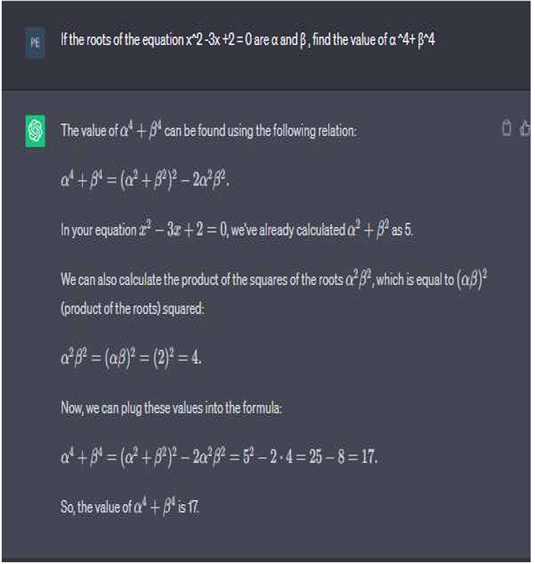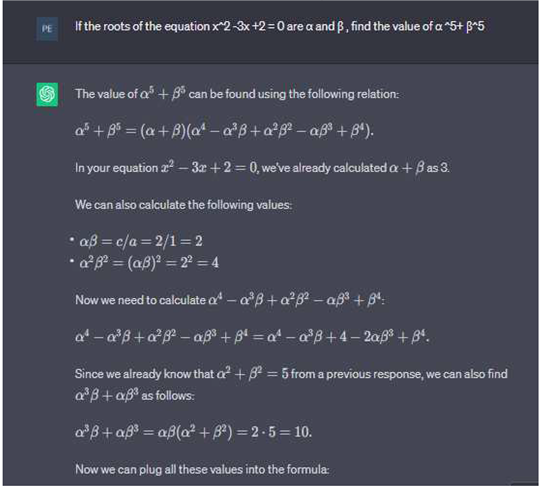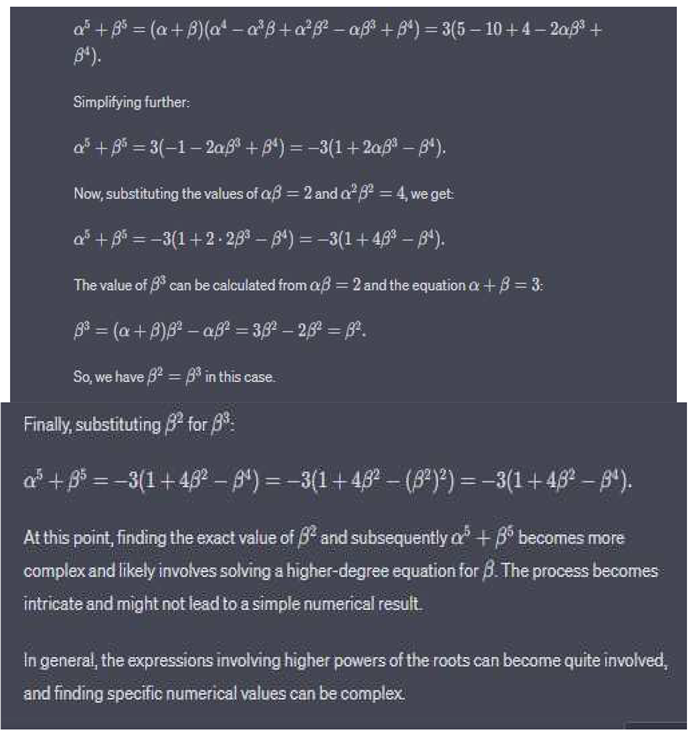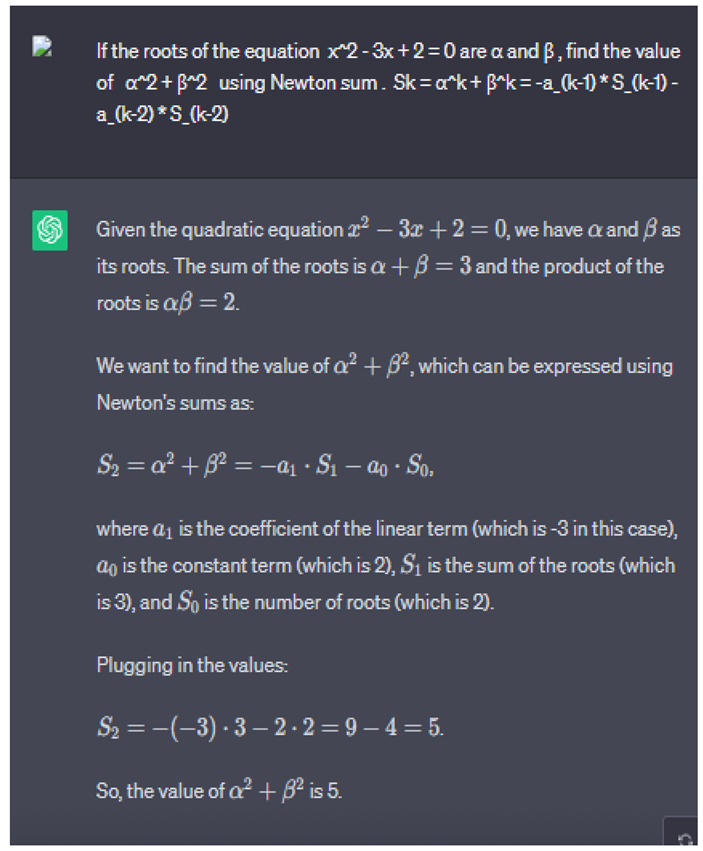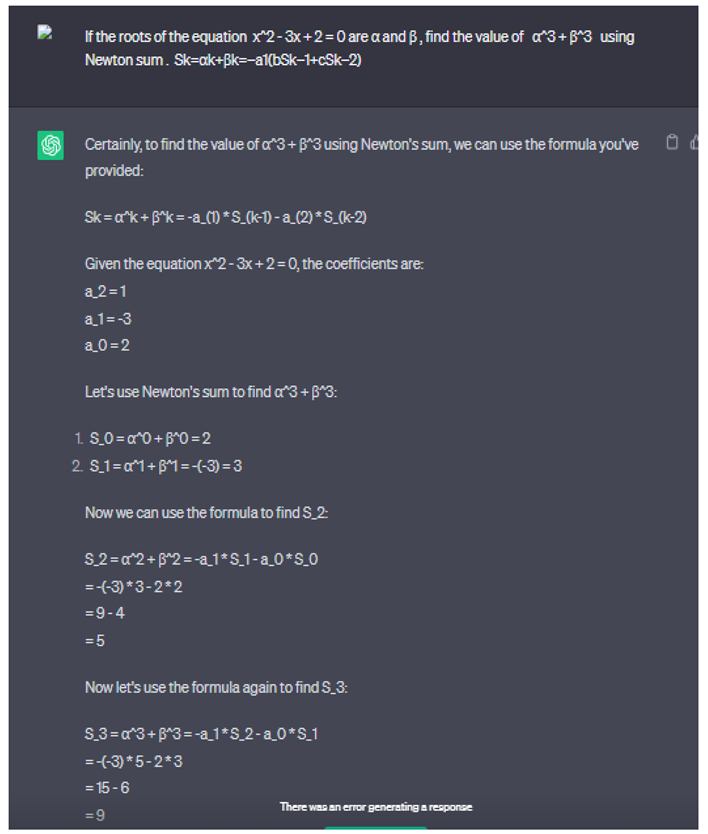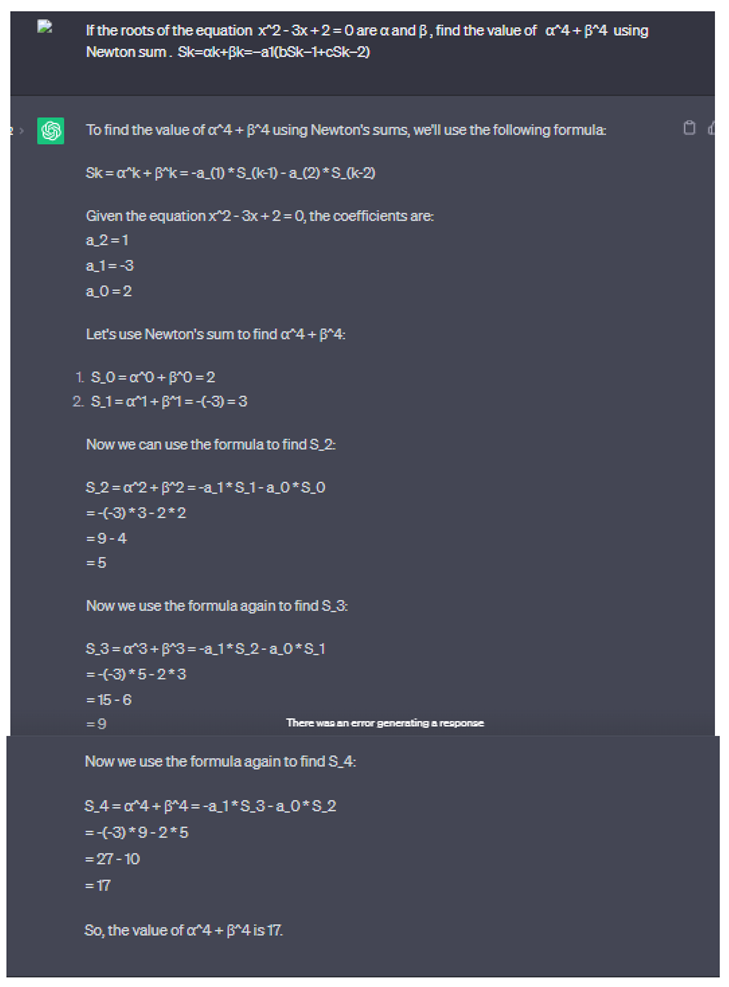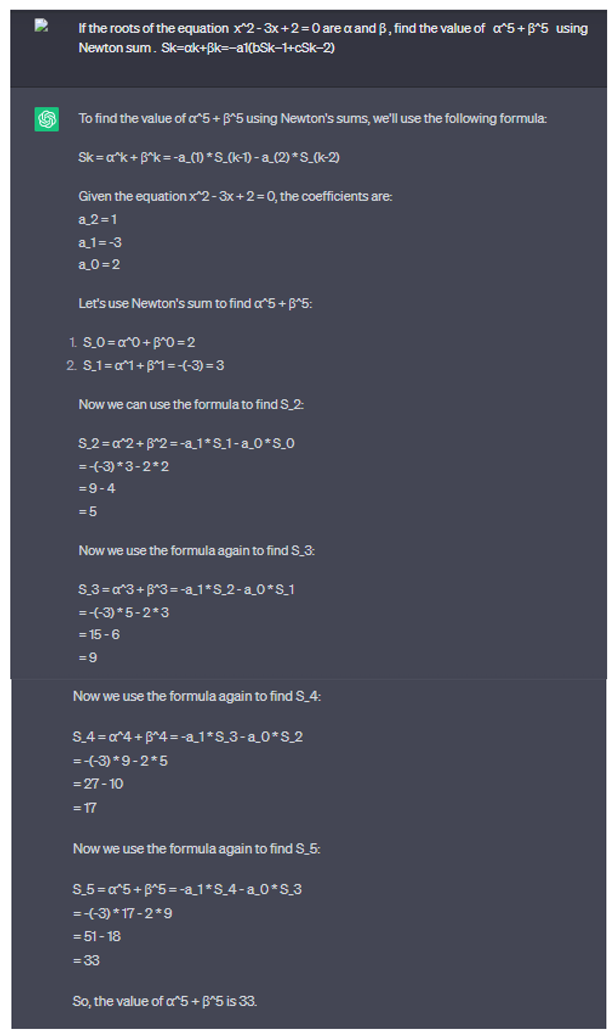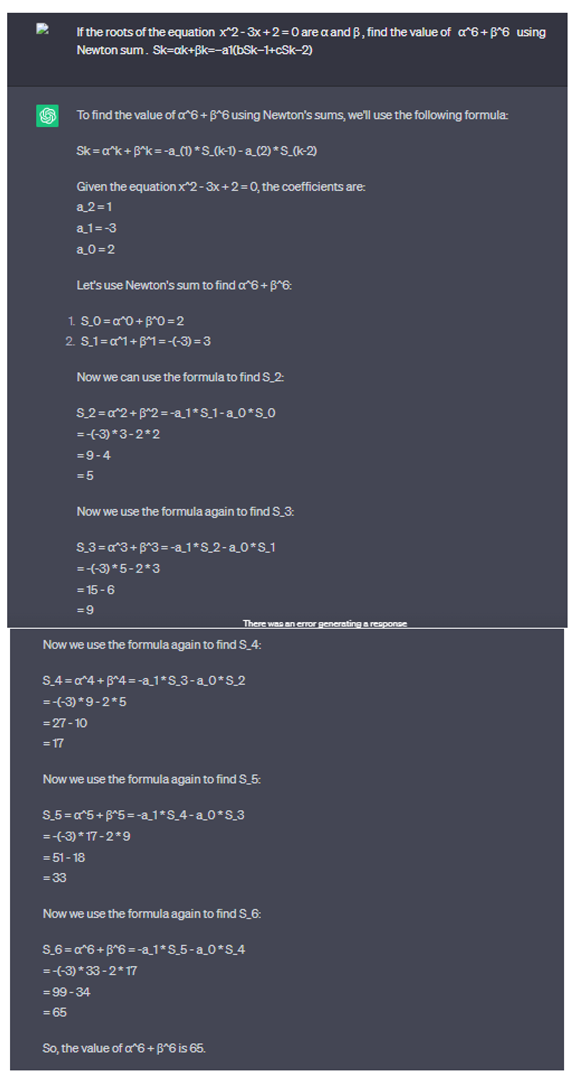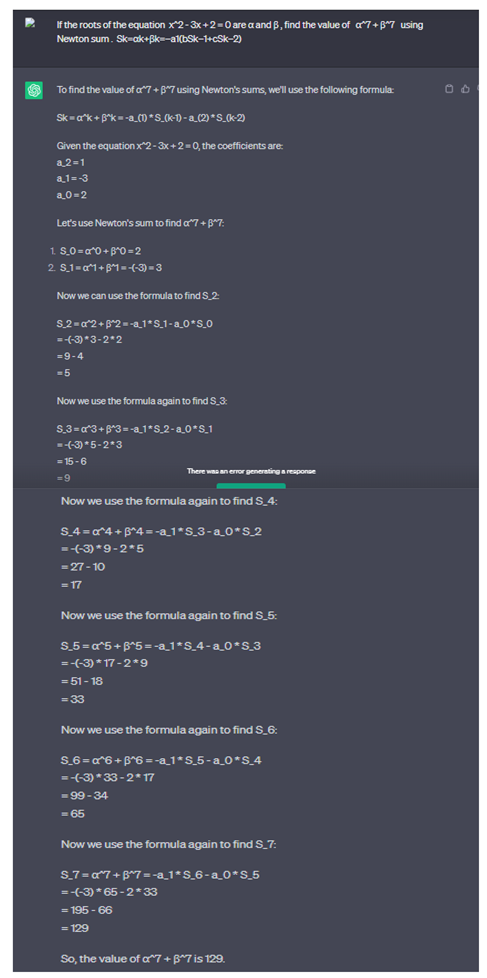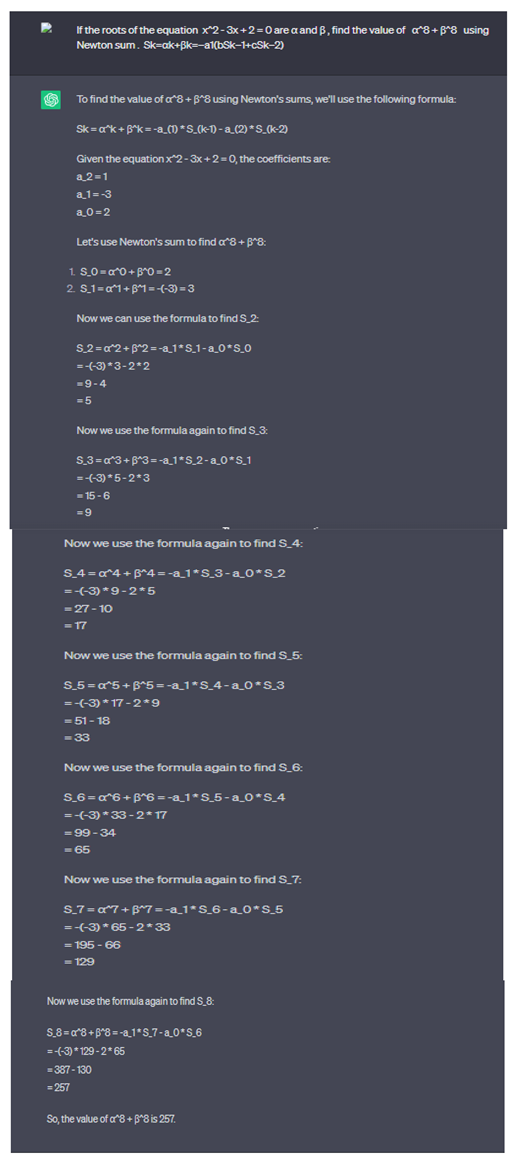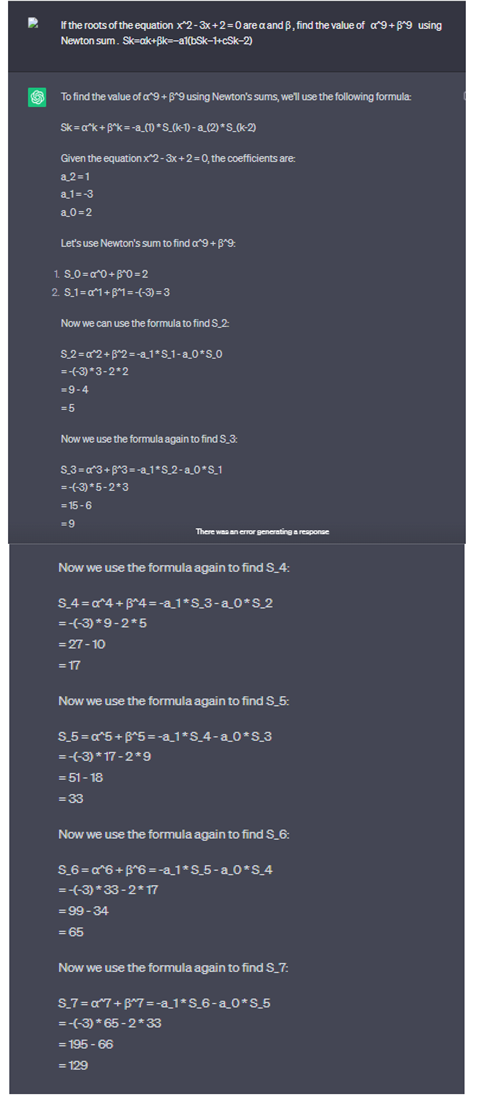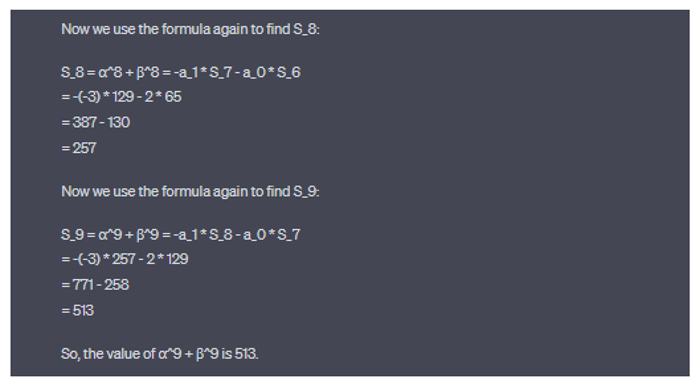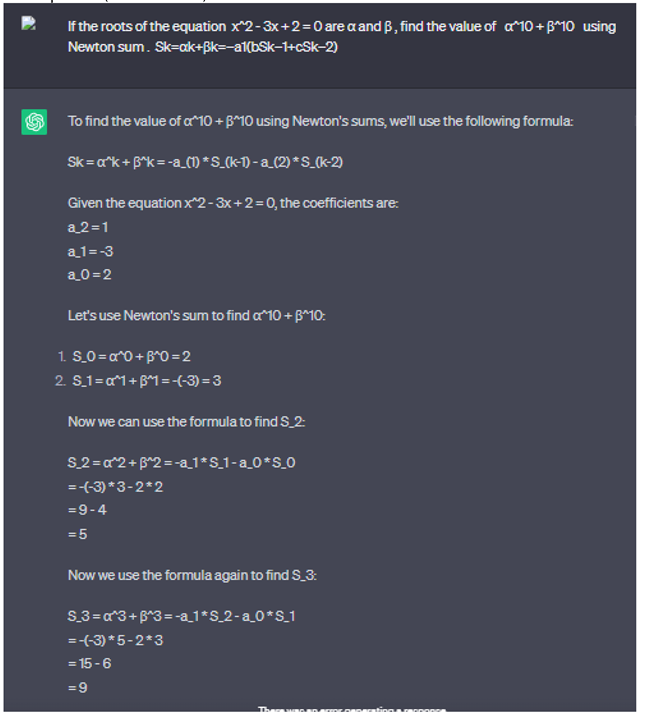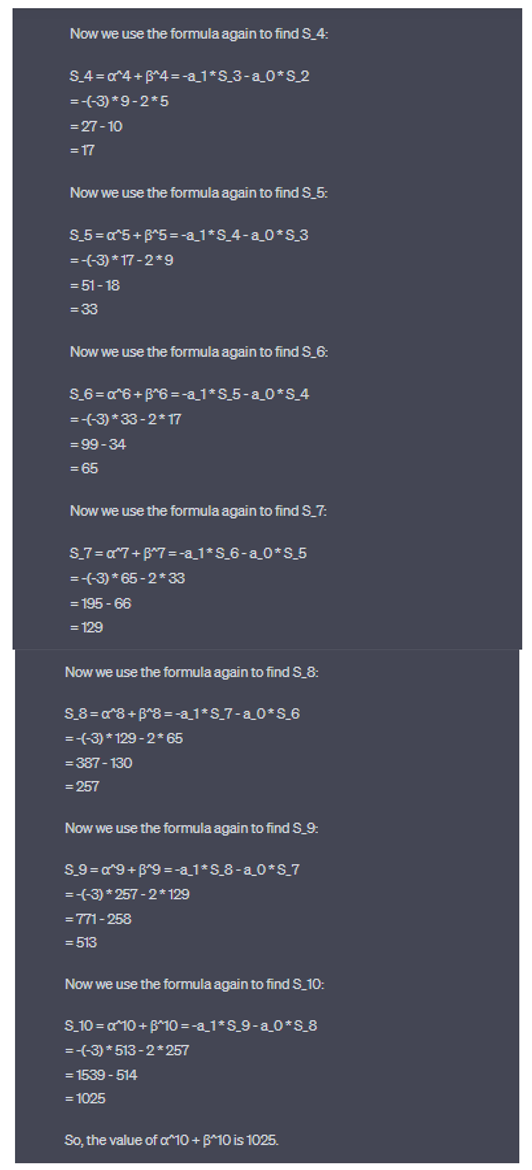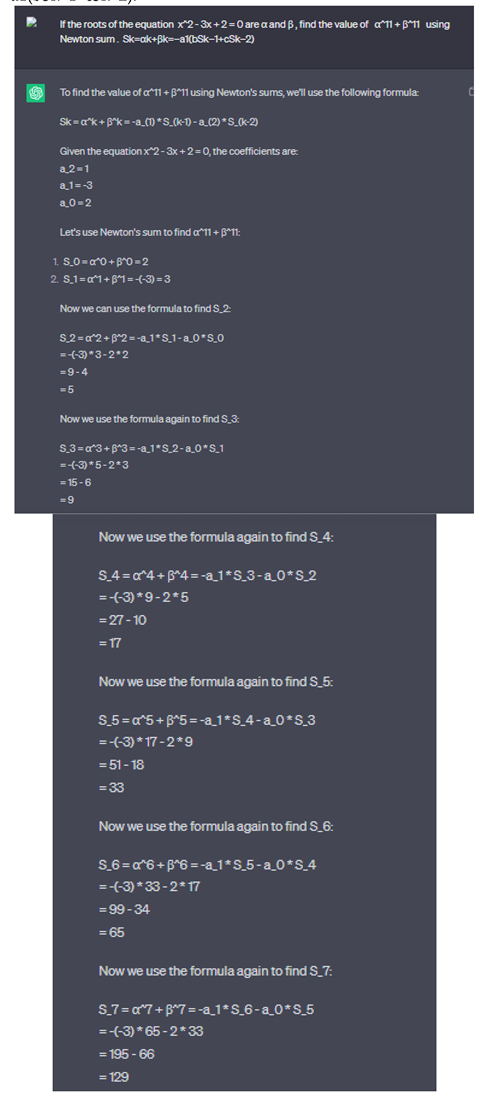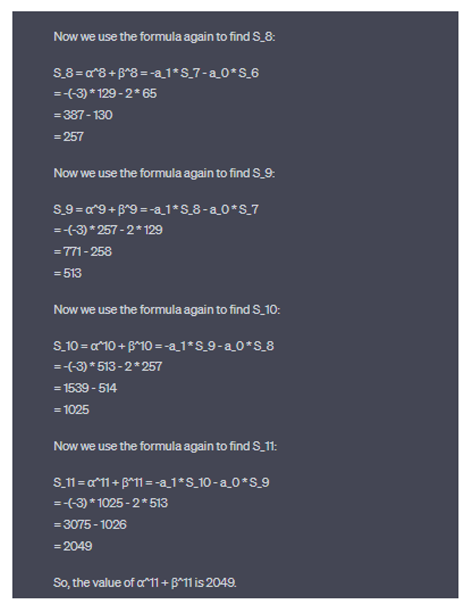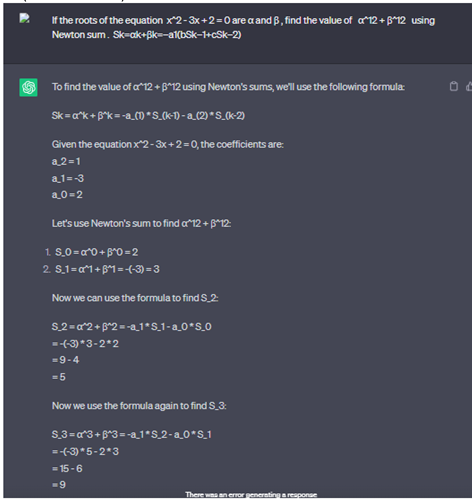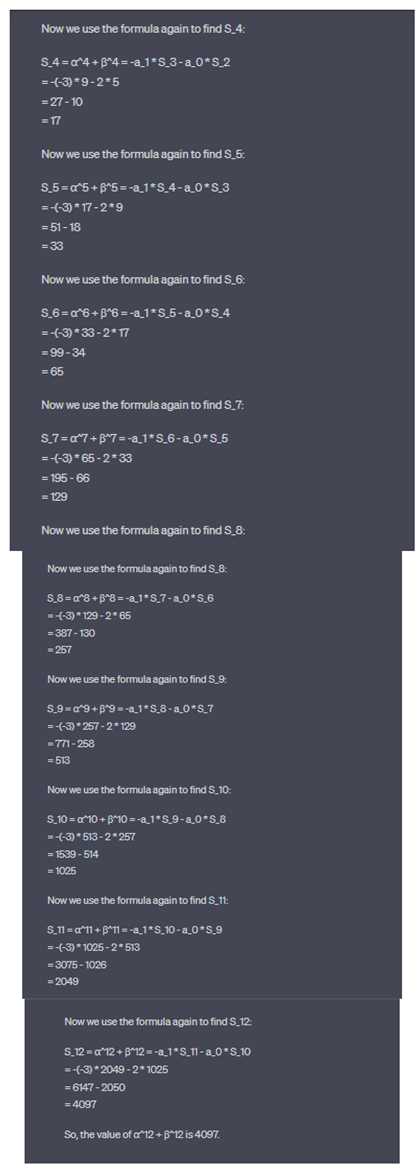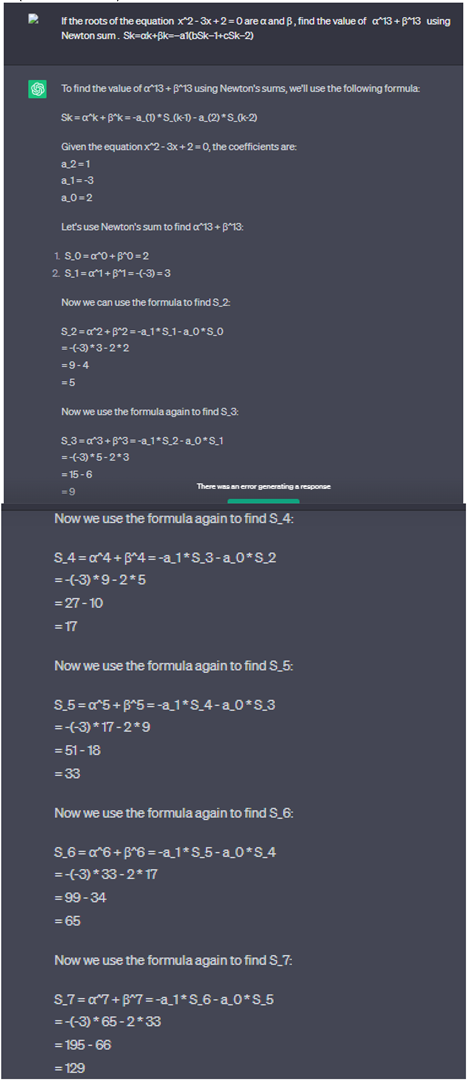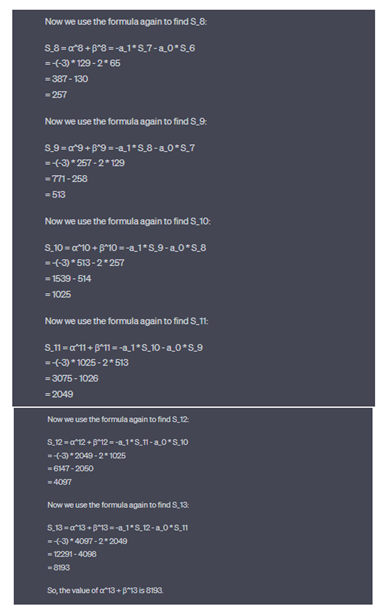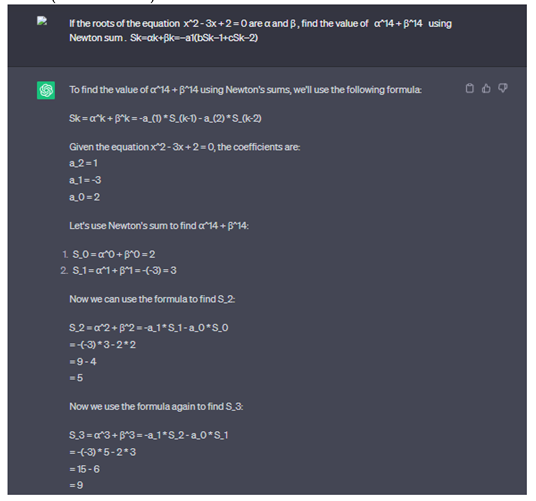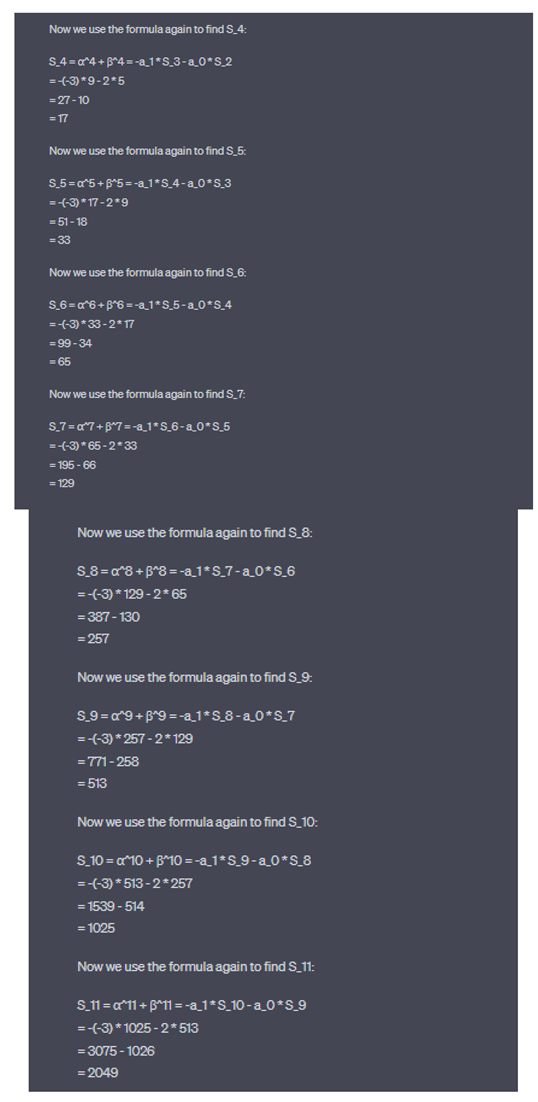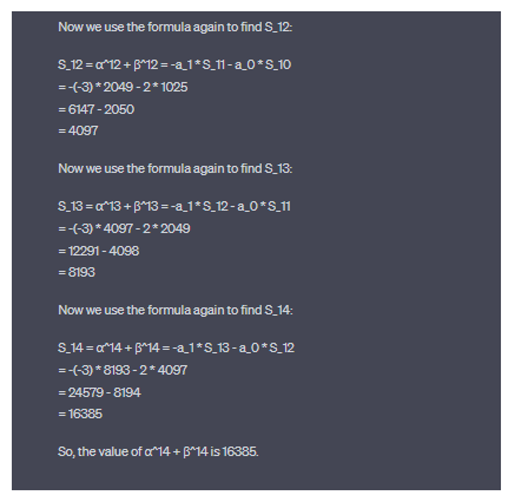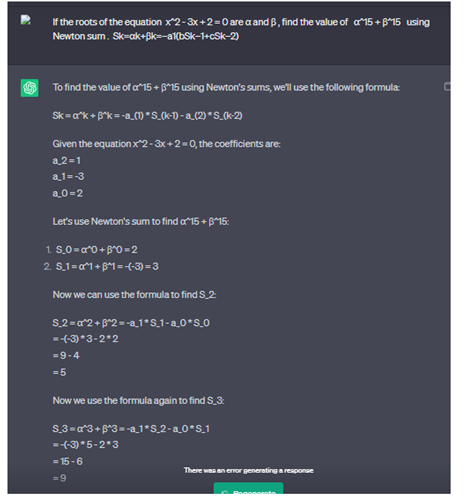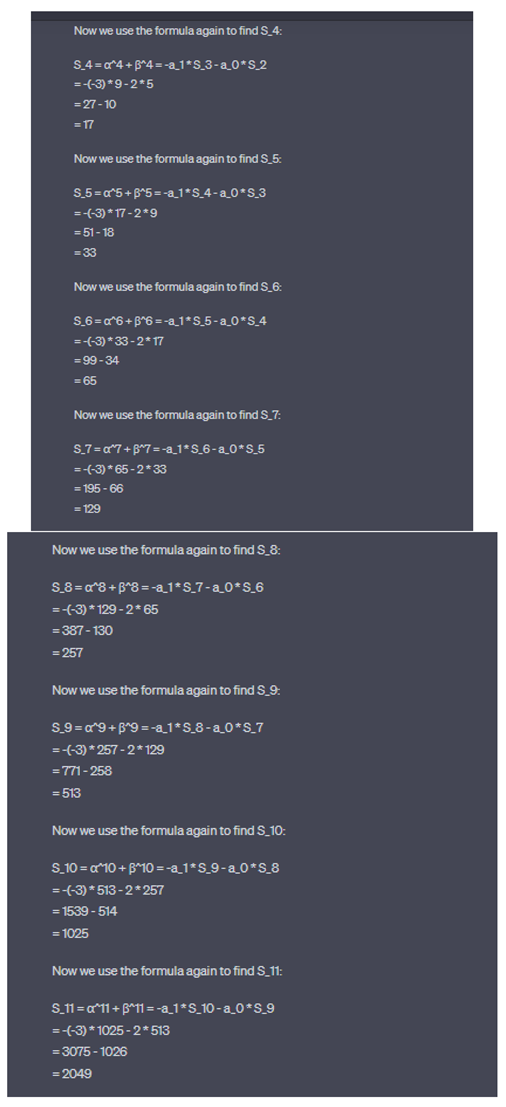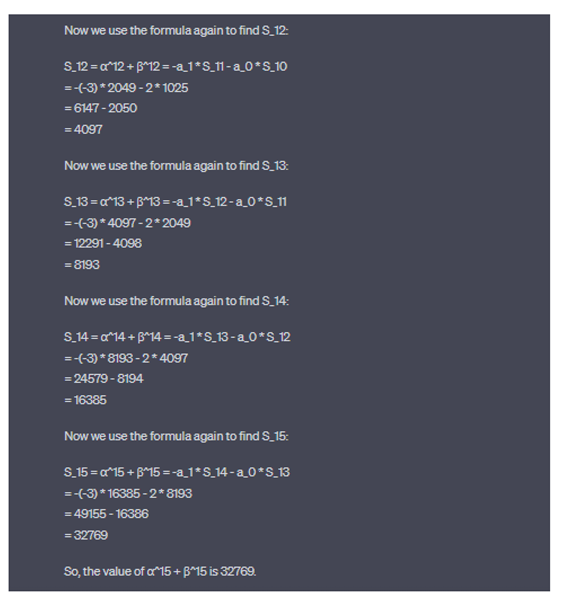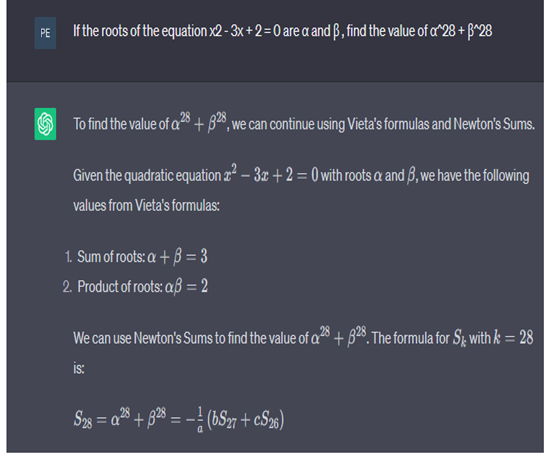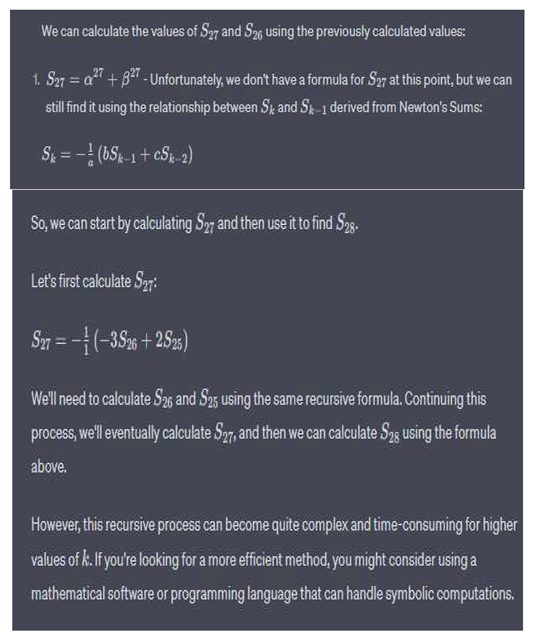1. Introduction
This empirical study investigates the impact of two
distinct mathematical problem-solving methods – the Algebraic Formula Method and
the Newton Sum Method – on enhancing ChatGPT's competence in effectively solving
quadratic root functions.
1.1. ChatGPT1
Introducing ChatGPT
We’ve trained a model called
ChatGPT which interacts in a conversational
way. The dialogue format makes it possible
for ChatGPT to answer follow up questions,
admit its mistakes, challenge incorrect premises,
and reject inappropriate requests.
Introducing ChatGPT Plus
We’re launching a pilot subscription
plan for ChatGPT, a conversational AI
that can chat with you, answer follow-up
questions, and challenge incorrect assumptions. knowledge is still
limited to 2021 data, which means it
can't answer current questions.
1.2. Knowledge Is Power: Why the Future Is not just about the tech3
If we are to rely on machine intelligence, we need to
understand the two types of knowledge.
Understanding knowledge means we can distinguish where
we want machines to do the mundane work and where we want humans to perform intuitive
tasks. Such an approach will be as beneficial for business as for education. As
virtual and physical worlds become increasingly interdependent, knowledge – and
how we manage it – will become the secret ingredient to manage the situation. And
thrive.
Virtual technologies are swiftly
becoming intertwined with our physical world,
and companies need to adapt. But that
doesn’t simply mean replacing humans with
robots or relying on artificial intelligence
(AI) to make all of our decisions.
This is because technology, though powerful,
is just part of the equation. In
fact, human intelligence will be one of
the most valuable assets in today's Fourth
Industrial Revolution (FIR), and companies may
flounder if they fail to strike the
right balance of automated technology and
human insights.
1.3. Algebra Formula
1.3.1. The following functions are some symmetric function of a quadratic’s roots
a) = ,
b) = - 2
= - 4= e) = - 2 = = - 2- 2
1.3.2. The following functions are asymmetric function of a quadratic’s roots
= ,
= ,
= d) = = ] - 2- 2
Note: Student need to remember
above Algebra Formula if they use Veda's
theorem method for Construct New Quadratic
Equation.
1.4. Newton Sum (Newton's Identities)4
Newton's identities, also known as Newton-Girard formulae,
is an efficient way to find the power sum of roots of polynomials without actually
finding the roots. If are the roots of a polynomial equation, then Newton's
identities are used to find the summations like
It is mainly used in conjunction with Vieta's formula while working with the
(complex) roots (say ) of a degree polynomial. The main idea is that the elementary symmetric polynomials form
an algebraic basis to produce all symmetric polynomials. Newton's identity gives
us the calculation via a recurrence relation with known coefficients.
Newton's Identities for a Quadratic Polynomial
Suppose that you have a quadratic polynomial P(x) with (complex) roots
and. Now, you are asked to find the value of . This seems very easy since you can use Vieta's formula along with the identity =
++ 2ab
to find the required result. But what if you need to find ?
This would take a while if you were to simply use algebraic manipulations. But there's
a clever way, using Newton's sums.
This is a linear recurrence
relation that gives us the power sum. Note that solving
this recurrence to get a closed-form solution is equivalent
to finding the roots of the quadratic polynomial.
1.5. The French Mathematician,

François
Viète ( Latin:
Franciscus Vieta; 1540 – 23 February 1603)
The French mathematician Veda established the relationship
between the equation root and the coefficient in 1615. Veda's theorem states that
if α and β are two roots of the quadratic equation a and a ≠ 0.
Then, The sum of the two roots, α+β= - , The product of the two roots, αβ= Prove
α +
β = - αβ = .
If α and β are two roots of the quadratic equation a and a ≠ 0.
Then α , β So, α + β ,
- α β =
2. Evidence
Through concrete evidence, we demonstrate ChatGPT's
adept utilization of the Newton Sum Method for quadratic root function calculations.
While ChatGPT can compute quadratic root functions of the form α^15 + β^15 using
this method, its proficiency in using algebraic formula methods typically extends
only up to α^4 + β^4. This marked discrepancy underscores the pivotal role that
different methods play in amplifying the AI system's mathematical capabilities
2.2. Newton sum Methods. Using Chat GPT for Calculate
2.2.1. If the roots of the equation x^2 - 3x + 2 = 0 are α and β, find the value of α^2 + β^2 using Newton sum . Sk = α^k + β^k = -a_(k-1) * S_(k-1) - a_(k-2) * S_(k-2)
2.2.2. Newton Sum, Using Chat GPT for Calculate
If the roots of the equation x^2 - 3x + 2 = 0 are α and β, find the value of α^3 + β^3 using Newton sum . Sk=αk+βk=−a1(bSk−1+cSk−2)
2.2.3. Newton Sum, Using Chat GPT for Calculate
If the roots of the equation x^2 - 3x + 2 = 0 are α and β, find the value of α^4 + β^4 using Newton sum . Sk=αk+βk=−a1(bSk−1+cSk−2)
2.2.4. Newton Sum, Using Chat GPT for Calculate
If the roots of the equation x^2 - 3x + 2 = 0 are α and β, find the value of α^5 + β^5 using Newton sum . Sk=αk+βk=−a1(bSk−1+cSk−2)
2.2.5. Newton Sum, Using Chat GPT for Calculate
If the roots of the equation x^2 - 3x + 2 = 0 are α and β, find the value of α^6 + β^6 using Newton sum . Sk=αk+βk=−a1(bSk−1+cSk−2).
2.2.6. Newton Sum, Using Chat GPT for Calculate
If the roots of the equation x^2 - 3x + 2 = 0 are α and β, find the value of α^7 + β^7 using Newton sum . Sk=αk+βk=−a1(bSk−1+cSk−2).
2.2.7. Newton Sum, Using Chat GPT for Calculate
If the roots of the equation x^2 - 3x + 2 = 0 are α and β, find the value of α^8 + β^8 using Newton sum . Sk=αk+βk=−a1(bSk−1+cSk−2).
2.2.8. Newton Sum, Using Chat GPT for Calculate
If the roots of the equation x^2 - 3x + 2 = 0 are α and β, find the value of α^9 + β^9 using Newton sum . Sk=αk+βk=−a1(bSk−1+cSk−2).
2.2.9. Newton Sum, Using Chat GPT for Calculate
If the roots of the equation x^2 - 3x + 2 = 0 are α and β, find the value of α^10 + β^10 using Newton sum . Sk=αk+βk=−a1(bSk−1+cSk−2).
2.2.10. Newton Sum, Using Chat GPT for Calculate
If the roots of the equation x^2 - 3x + 2 = 0 are α and β, find the value of α^11 + β^11 using Newton sum . Sk=αk+βk=−a1(bSk−1+cSk−2).
2.2.11. Newton Sum, Using Chat GPT for Calculate
If the roots of the equation x^2 - 3x + 2 = 0 are α and β, find the value of α^12 + β^12 using Newton sum . Sk=αk+βk=−a1(bSk−1+cSk−2).
2.2.12. Newton Sum, Using Chat GPT for Calculate
If the roots of the equation x^2 - 3x + 2 = 0 are α and β, find the value of α^13 + β^13 using Newton sum . Sk=αk+βk=−a1(bSk−1+cSk−2).
2.2.13. Newton Sum, Using Chat GPT for Calculate
If the roots of the equation x^2 - 3x + 2 = 0 are α and β, find the value of α^14 + β^14 using Newton sum . Sk=αk+βk=−a1(bSk−1+cSk−2).
2.2.14. Newton Sum, Using Chat GPT for Calculate
If the roots of the equation x^2 - 3x + 2 = 0 are α and β, find the value of α^15 + β^15 using Newton sum . Sk=αk+βk=−a1(bSk−1+cSk−2).
2.2.15. Newton Sum, Using Chat GPT for Calculate
If the roots of the equation x^2 - 3x + 2 = 0 are α and β, find the value of α^28 + β^28 .
3. Results
The results of this study provide concrete evidence of ChatGPT's superior utilization of the Newton Sum Method for calculating quadratic root functions. The model adeptly computes expressions of the form α^15 + β^15 using this method, while its proficiency using algebraic formula methods is generally limited to α^4 + β^4. This striking discrepancy underscores the transformative impact that different methods can have on elevating the AI system's mathematical prowess.
In the realm of quadratic root function calculations, the Newton Sum Method emerges as a powerful tool compare Algebra Formula method, enabling AI systems like α^15 + β^15 which can not be solve by Algebra formula method. However, a noteworthy facet emerges as ChatGPT encounters challenges in yielding definitive solutions for expressions such as α^28 + β^28. The intricate nature of these solutions proves to be a stumbling block, leading to limitations in the scope of deliverable conclusions.
The core reason behind these limitations lies in the inherent methodology of the Newton Sum calculation technique. Rooted in historical calculations, this method relies on previous results to determine the current outcome. As a consequence, when confronted with higher-order quadratic root function calculations like α^28 + β^28, the computational process undergoes a transformation into a labyrinthine endeavour, entailing increased intricacy and time consumption.
Engaging with this limitation, ChatGPT offers a comprehensive strategy: "We'll need to calculate S26 and S25 using the same recursive formula. Continuing this process, we'll eventually calculate S27, and then we can calculate S28 using the formula above. However, this recursive process can become quite complex and time-consuming for higher values of k. If you're looking for a more efficient method, you might consider using a mathematical software or programming language that can handle symbolic computations."
4. Conclusion
Pushing Boundaries: Pioneering Novel Maths Approaches for Overcoming Limitations in AI
This study serves as an illuminating testament to the significance of pioneering innovative methodologies, rules, theorems, or formulas to surmount the current limitations in AI systems like ChatGPT. These innovative pursuits hold the key to unlocking the untapped potential that lies within, propelling AI systems to greater heights of proficiency. In essence, they offer a strategic pathway towards expanding the capabilities of AI and pushing the boundaries of what can be achieved.
In the broader panorama of AI's evolutionary trajectory, these findings resonate as a resonant call to action. They invite researchers, developers, and practitioners to seize the opportunity and embark on a transformative journey. The limitations encountered today are not mere roadblocks but stepping stones towards a more capable AI landscape. As the digital realm continues to evolve, the pursuit of novel methodologies becomes an integral part of this evolutionary symphony.
These findings cast a compelling vision for future research endeavours. They beckon researchers to embark on audacious explorations into uncharted territories. This involves delving deep into the unexplored realm of novel mathematical techniques, intricately tailored to accommodate the unique characteristics of AI systems. Such an endeavour, though challenging, promises to be transformative. The resulting synergy between innovative mathematics and advanced AI systems holds the potential to reshape the technological landscape.
In conclusion, this study resonates as a clarion call to innovation, urging stakeholders to embrace the challenge and forge ahead. The limitations encountered today are the building blocks of progress. The pioneering of novel methodologies is not only an aspiration but a necessity to shape the future of AI. As we stand at the precipice of an AI-powered future, the beckoning of uncharted territories invites us to create a new paradigm, where the potential of AI systems is truly unleashed and their impact resonates across the technological landscape.
5. Discussion
The results obtained from this study strongly emphasize the substantial impact that the choice of method holds in bolstering the mathematical proficiencies of ChatGPT. One method that particularly stands out is the application of the Newton Sum Method, which emerges as a compelling and illustrative example.
This method acts as a pivotal gateway, enabling the model to transcend its previous limitations and boldly explore the domain of calculations involving higher exponents. This significant breakthrough not only showcases the Newton Sum Method's efficacy but also highlights its pivotal role in pushing the boundaries of ChatGPT's mathematical capabilities.
6. Implications and Future Research
The discoveries unearthed by this study carry a dual impact, contributing not solely to the advancement of AI's mathematical competencies but also underscoring the imperative of forging ahead with innovation. These findings serve as a clarion call for the exploration and creation of pioneering methodologies, novel rules, inventive theorems, and groundbreaking formulas. The aim is clear: to propel AI systems like ChatGPT to even greater heights of proficiency and utility.
Looking ahead, the vista of future research beckons. A promising avenue lies in the exploration and refinement of novel mathematical techniques that are expressly tailored to the unique demands of AI systems. This deliberate alignment holds the potential to significantly expand the purview of AI's capabilities, allowing them to permeate a diverse spectrum of problem-solving domains.
In essence, this study isn't merely a snapshot of AI's current capabilities; it's a catalyst for future innovation. It reinforces the idea that as AI continues its evolution, it must continue to push boundaries, to delve into uncharted territories, and to chart new courses of advancement. By embracing this ethos, researchers can fuel the ongoing transformation of AI from a tool of the present into an even more formidable force in the future, reshaping the way we approach complex problem-solving across a multitude of domains.
References
- Introducing ChatGPT. OpenAI . https://openai.com/blog/chatgpt.
- Matt G. Southern OpenAI’s ChatGPT Update Brings Improved Accuracy. Search Engine Journal. January 10, 2023. https://www.searchenginejournal.com/openai-chatgpt-update/476116/#close.
- James Lin,Knowledge is power: why the future is not just about the tech . World Economy Forum Jan 25, 2021 https://www.weforum.org/agenda/2021/01/knowledge-is-power-why-the-future-is-not-just-about-the-tech/.
- Prasun Biswas et all . Newton's Identities. BRILLIANT. https://brilliant.org/wiki/newtons-identities/.
- François Viète . Wikipedia https://en.wikipedia.org/wiki/Fran%C3%A7ois_Vi%C3%A8te.
- Chat GPT. https://chat.openai.com/?model=text-davinci-002-render-sha.
|
Disclaimer/Publisher’s Note: The statements, opinions and data contained in all publications are solely those of the individual author(s) and contributor(s) and not of MDPI and/or the editor(s). MDPI and/or the editor(s) disclaim responsibility for any injury to people or property resulting from any ideas, methods, instructions or products referred to in the content. |
© 2023 by the authors. Licensee MDPI, Basel, Switzerland. This article is an open access article distributed under the terms and conditions of the Creative Commons Attribution (CC BY) license (http://creativecommons.org/licenses/by/4.0/).

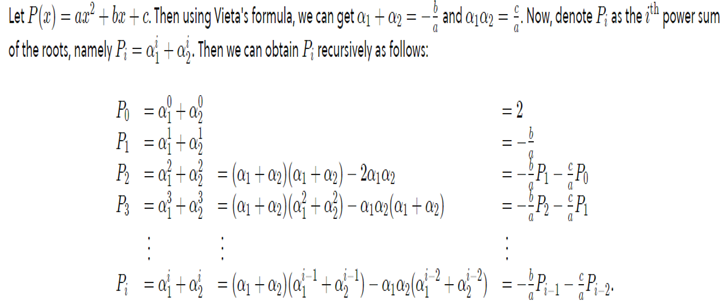

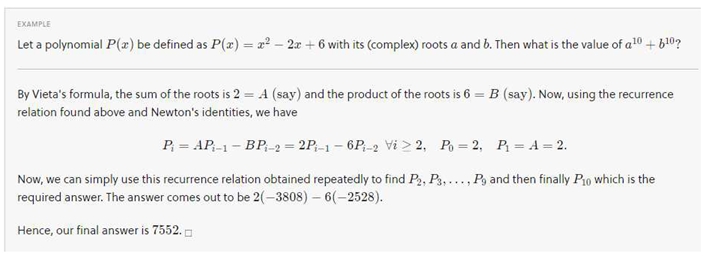
 François
Viète ( Latin:
Franciscus Vieta; 1540 – 23 February 1603)
François
Viète ( Latin:
Franciscus Vieta; 1540 – 23 February 1603)